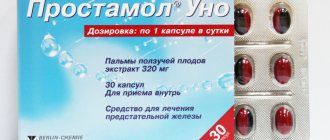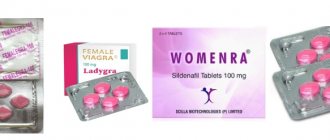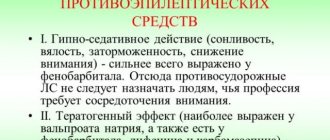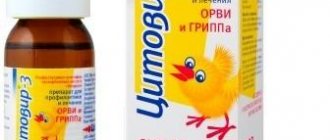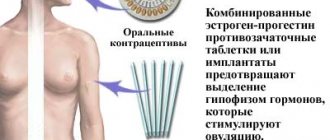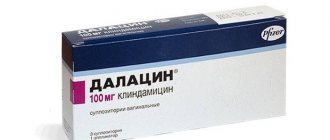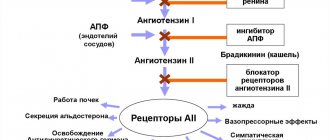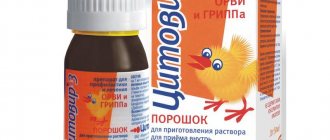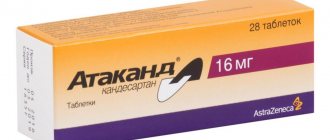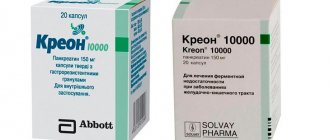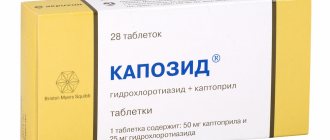During the season of viral diseases, many are looking for immunomodulators and antiviral drugs, because no one wants to get sick. One of these drugs is Cytovir-3. This is the newest drug from this group. It is considered one of the most effective in the fight against influenza, ARVI and other seasonal diseases.
Release form and composition
Dosage forms of the drug Cytovir-3:
- capsules: gelatin hard, size No. 3, body – white, cap – orange; the capsules contain odorless powder, from yellow to white (in polymer jars of 12 pcs., in a cardboard pack 1 jar; in blister packs of 12 pcs., in a cardboard pack 1, 2 or 4 packages);
- powder for preparing a solution for oral administration (for children) strawberry, orange, cranberry or without flavor: white or white with a yellowish tint; the aqueous solution has a characteristic odor of strawberries, cranberries or oranges or is odorless (20 g each in dark glass or polymer bottles, 1 bottle in a cardboard box complete with a measuring cup or dosing spoon or dosing pipette);
- syrup (for children): color - from yellow to colorless (50 ml in dark glass bottles, 1 bottle in a cardboard box, complete with a measuring cup or dosing spoon or dosing pipette).
Active ingredients contained in 1 capsule, 1 ml of ready-made solution for oral administration and 1 ml of syrup:
- alpha-glutamyl-tryptophan sodium – 0.5/0.15/0.15 mg;
- bendazole hydrochloride – 20/1.25/1.25 mg;
- ascorbic acid – 50/12/12 mg.
Auxiliary components:
- 1 capsule: lactose monohydrate – 97.8 mg; calcium stearate – 1.7 mg; shell (body/lid): titanium dioxide – 2/2%; sunset yellow dye – 0/0.219%, azorubine dye – 0/0.0328%; gelatin – up to 100/100%;
- 1 ml of ready solution (without flavor/with flavor): fructose – 386.6/386.2 mg; flavoring identical to natural “Strawberry”, “Orange” or “Cranberry” – 0/0.4 mg;
- 1 ml of syrup: sucrose – 800 mg; purified water – up to 1 ml.
Analogues of the drug
Tsitovir-3 has many analogues:
- Alokin alpha;
- Arbidol;
- Anaferon;
- Timalin;
- Kagocel;
- Immunal;
- Echinacin Madaus;
- Glutoxim;
- Lavomax;
- Orvirem;
- Lynchy;
- Arbivir-health.
These drugs are different in composition, but identical in action. All of them are aimed at activating the immune system and fighting viruses. Their effectiveness is different, the price is also different. Immunal, for example, contains an extract of the herb Echinacea, this is a herbal preparation. And Kagocel is a chemical preparation containing the sodium salt of a copolymer.
Anaferon is an interferon derivative that activates the body’s own immunity. Arbidol has an antiviral effect. So you need to select the drug in accordance with the doctor’s recommendation and the degree of the disease.
Contraindications
Absolute:
- diabetes mellitus (syrup and oral solution);
- age up to 1 year (syrup and oral solution) or 6 years (capsules);
- pregnancy;
- individual intolerance to the components of the drug.
Relative (diseases/conditions for which Cytovir-3 is prescribed with caution):
- arterial hypertension (you should consult your doctor before taking it);
- period of breastfeeding (taking the drug Cytovir-3 for therapeutic/prophylactic purposes is possible only in cases where the expected benefit exceeds the possible harm; consultation with a specialist is necessary).
Side effects of Tsitovir 3
Reviews of Cytovir 3 note that the medicine is generally well tolerated by patients. In individual cases, people with vegetative-vascular dystonia may develop arterial hypotension.
Also, during therapy, allergic reactions may occur in the form of skin rash, urticaria, swelling, burning, itching.
If adverse reactions occur in the body, it is necessary to discontinue the drug and further symptomatic treatment under the supervision of the attending physician.
Directions for use and dosage
Tsitovir-3 is taken orally, preferably 30 minutes before meals.
The regimens for using the drug for treatment and prevention are no different.
The frequency of administration is 3 times a day.
Recommended single doses of Cytovir-3 in the dosage form of syrup or oral solution for children:
- 1–3 years: 2 ml;
- 3–6 years: 4 ml;
- 6–10 years: 8 ml;
- from 10 years: 12 ml.
Tsitovir-3 capsules for adults and children over 6 years of age are prescribed 1 capsule three times a day.
Duration of the course – 4 days. If there is no effect, the condition worsens, or new symptoms appear after 3 days of using the drug, it is recommended to consult a doctor.
If necessary, the preventive course can be repeated after 3–4 weeks.
To prepare the solution, add 40 ml of water (boiled, cooled to room temperature) to a bottle with powder and shake well (until the powder is completely dissolved). The resulting volume of the drug is 50 ml.
Indications for use
Tsitovir-3® is used for the prevention, treatment and prevention of complications of influenza and other acute respiratory viral infections in adults and children, according to the instructions.
Proven clinical effect
Tsitovir-3® is a means of immunostimulating, antiviral therapy, since it has an interferonogenic effect. It selectively attacks the viruses that cause influenza and ARVI and mobilizes all parts of the immune system to fight them. In the shortest possible time, Cytovir-3® stops the development of the disease, suppressing the ability of viruses to reproduce, and also neutralizes the toxic products of their vital activity, alleviating the patient’s condition. Against the background of complex therapy with the inclusion of the drug Cytovir-3®, a statistically significant reduction in the duration of the main clinical symptoms of the disease (intoxication, hyperthermia, catarrhal syndrome) and the acute period of the disease is observed.
Drug safety
In normal course doses, Cytovir-3® has no side effects, does not accumulate in the body and does not form toxic products during metabolism.
According to the Research Institute of Influenza, during the entire period of medical use of the Cytovir-3® complex, not a single case of any complications or adverse reactions was noted. Moreover, outpatient doctors note good tolerability of the drug and a noticeably milder course of the disease, faster recovery of patients without any post-infectious complications.
Tsitovir-3® is recommended for use by specialists from the Research Institute of Influenza of the Russian Academy of Medical Sciences, the Research Institute of Children's Infections of the Ministry of Health of the Russian Federation, the Research Institute of Experimental Medicine of the Russian Academy of Medical Sciences and many other Russian research sites.
Drug interactions
There are no data on the interaction of the drug Cytovir-3 with other drugs/substances.
Possible combined use with drugs with antiviral effects and drugs used to reduce the severity of symptoms of influenza and ARVI.
When carrying out combination therapy, it is necessary to take into account the properties of the active ingredients of the drug Cytovir-3.
Bendazole:
- non-selective beta-blockers: the likelihood of an increase in total peripheral vascular resistance is reduced;
- antihypertensive and diuretic drugs: their hypotensive effect increases;
- phentolamine: the hypotensive effect of bendazole is enhanced.
Ascorbic acid:
- oral contraceptives, acetylsalicylic acid, alkaline drinks, fresh juices: absorption of ascorbic acid is reduced;
- iron preparations: their absorption in the intestines improves;
- benzylpenicillin, tetracyclines: their concentration in the blood increases;
- heparin, indirect anticoagulants: their effectiveness decreases;
- acetylsalicylic acid, primidone, barbiturates: increased excretion of ascorbic acid in the urine;
- oral contraceptives: their concentration in the blood decreases;
- drugs with an alkaline reaction, including alkaloids: their excretion increases;
- antipsychotics (neuroleptics), including phenothiazine derivatives: their therapeutic effect decreases;
- isoprenaline: its chronotropic effect decreases;
- amphetamine, tricyclic antidepressants: their tubular reabsorption decreases.
Ingredients: per capsule
Active ingredients: alpha-glutamyl-tryptophan sodium (Timogen® sodium) 0.5 mg, ascorbic acid 50 mg, bendazole hydrochloride (Dibazol) 20 mg; Excipients: Lactose monohydrate 97.8 mg, calcium stearate 1.7 mg;
Composition of the capsule shell:
Body: titanium dioxide 2%, gelatin up to 100%. Cap: titanium dioxide 2%, sunset yellow dye 0.2190%, azorubine dye 0.0328, gelatin up to 100%.
Description:
Hard gelatin capsules No. 3 with a white body and an orange cap. The contents of the capsules are odorless, white to yellow powder.
Pharmacotherapeutic group:
Immunostimulating agent.
ATX code: L03AX
Pharmachologic effect:
Pharmacodynamics:
The drug is a means of etiotropic and immunostimulating therapy, has an indirect antiviral effect against influenza A and B pathogens, as well as other viruses that cause acute respiratory diseases.
Reduces the severity of the main clinical symptoms of influenza and ARVI, and also shortens the duration of the disease and promotes its uncomplicated course.
Increases the content of secretory immunoglobulin A (slgA) in the mucous membrane of the nasopharynx - the entrance gate of infection, increasing the local immunoresistance of the body to respiratory infections of a viral and bacterial nature.
With a preventive effect, the drug increases the potential metabolic activity of innate immune cells (neutrophil granulocytes and monocytes), which, in the event of infection, increases their ability to absorb and destroy bacterial and viral agents due to increased enzymatic (oxidative) activity, synthesis of cationic proteins and increased number of phagocytic cells. In this case, the initial state of metabolic activity of innate immune cells, in the absence of infectious agents, does not change, being within normal values.
Bendazole induces the body's production of endogenous interferon and has an immunomodulatory effect (normalizes the body's immune response to various infectious agents). Enzymes, the production of which is induced by interferon in the cells of various organs, inhibit viral replication.
Alpha-glutamyl-tryptophan (thymogen) is a synergist for the immunomodulatory effect of bendazole, normalizing the T-cell component of immunity.
Ascorbic acid activates the humoral component of the immune system, normalizes capillary permeability, thereby reducing inflammation, exhibits antioxidant properties, neutralizing oxygen radicals that accompany the inflammatory process, and increases the body's resistance to infection.
Pharmacokinetics:
When taken orally, the drug is completely absorbed from the gastrointestinal tract. The bioavailability of bendazole is about 80%, alpha-glutamyl tryptophan is no more than 15% and ascorbic acid is 90%. Metabolites of ascorbic acid and bendazole are excreted in the urine. Alpha-glutamyl-tryptophan, under the influence of peptidases, is broken down into L-glutamic acid and L-tryptophan, which are used by the body in peptide synthesis.
Indications for use:
Prevention and complex therapy of influenza and acute respiratory viral infections in adults and children over 6 years of age.
Contraindications:
Hypersensitivity to the components of the drug, pregnancy, children under 6 years of age.
Carefully:
during breastfeeding, use is possible if the expected benefit to the mother outweighs the potential risk to the child.
Directions for use and dosage:
Inside, 30 minutes before meals. Single dose for adults and children over 6 years of age – 1 capsule. For treatment: one capsule 3 times a day for 4 days. For prevention: - in direct contact with a patient with influenza and other acute respiratory viral infections, one capsule 3 times a day for 4 days. — during the period of epidemic rise in the incidence of influenza and other acute respiratory viral infections, one capsule 1 time per day for 12 days. Preventive courses, if necessary, are repeated after 3 weeks (until the epidemic situation normalizes).
Side effects:
Allergic reactions, short-term decrease in blood pressure.
Overdose:
Symptoms: short-term decrease in blood pressure in elderly patients with vegetative-vascular dystonia. Monitoring of kidney function, blood pressure and blood glucose concentrations is necessary.
Interaction with other drugs:
No interaction of alpha-glutamyl-tryptophan with drugs has been identified.
Bendazole prevents the increase in total peripheral vascular resistance caused by the use of non-selective beta-blockers. Strengthens the hypotensive (lowering blood pressure) effect of antihypertensive and diuretic drugs. Phentolamine enhances the hypotensive effect of bendazole.
Ascorbic acid increases the concentration in the blood of antibacterial drugs of the tetracycline series and benzylpenicillin. Improves the absorption of iron (Fe) preparations in the intestines. Reduces the effectiveness of heparin and indirect anticoagulants. Acetylsalicylic acid (ASA), oral contraceptives, fresh juices and alkaline drinks reduce its absorption and absorption. When used simultaneously with ASA, the urinary excretion of ascorbic acid increases and the excretion of ASA decreases. ASA reduces the absorption of ascorbic acid by approximately 30%. Ascorbic acid increases the risk of developing crystalluria when using drugs containing acetylsalicylic acid (ASA) and short-acting sulfonamides, slows down the excretion of acids by the kidneys, increases the excretion of drugs that have an alkaline reaction (including alkaloids), and reduces the concentration in the blood of oral contraceptives. When used simultaneously, it reduces the chronotropic effect of isoprenaline. Reduces the therapeutic effect of antipsychotic drugs (neuroleptics) - phenothiazine derivatives, tubular reabsorption of amphetamine and tricyclic antidepressants. Barbiturates and primidone increase the excretion of ascorbic acid in the urine.
Possible simultaneous use with antiviral drugs and symptomatic treatment of influenza and ARVI.
Consult your doctor if you are taking the medications listed in this section or other medications.
Special instructions:
The drug does not affect the ability to drive vehicles or engage in other potentially hazardous activities that require increased concentration and speed of psychomotor reactions.
Release form:
Capsules. 12 capsules each in a blister pack made of PVC/PCTFE/PVC film (polyvinyl chloride/polychlorotrifluoroethylene/polyvinyl chloride) or PVC/PVDC/PVC (polyvinyl chloride/polyvinylidene chloride/polyvinyl chloride) and printed varnished aluminum foil. One, or two, or four blister packs with instructions for use in a cardboard pack.
Storage conditions:
At a temperature not higher than 25 oC. Keep out of the reach of children.
Best before date:
3 years. Do not use after the expiration date stated on the packaging.
Vacation conditions:
Over the counter.
Legal entity in whose name the registration certificate was issued: Joint Stock Company Medical-Biological Research and Production Complex Cytomed, Russia. (Cytomed Oy). Production site address: Finland, 55300 Rauha, Laastitie 1 Cytomed Oy. Finland, 55300 Rauha, Laastitie 1. Name and address of the organization authorized by the holder (owner) of the registration certificate of a medicinal product for medical use to accept claims from the consumer: JSC MBNPC Cytomed, Russia. 194356, St. Petersburg, Orlovo-Denisovsky prospect, 14, building 1, tel., cytomed.ru.
Pharmacological properties
Pharmacological activity is due to the chemical compounds that make up Cytovir-3.
Bendazole
has immunomodulatory activity: stimulates phagocytes and natural killer cells. Activates the antiviral activity of natural immune cells, probably through the toll-like receptor system. Induces the body's production of endogenous interferon. Enzymes induced by interferon in cells of various organs inhibit viral replication. In addition, by activating immunocompetent cells, the drug helps normalize innate immunity.
Glutamyl-tryptophan dipeptide
exhibits the properties of an agonist of the type III glutamate metabotropic receptor. The dipeptide has a pronounced immunomodulatory effect, manifested in the stimulation of cells of the central and peripheral immune system, mainly the T-cell component. The dipeptide activates a subpopulation of natural killer cells. Glutamyl-Tryptophan is able to suppress the activity of pro-inflammatory cytokines and activate anti-inflammatory cytokines in various diseases and pathological processes of an infectious-inflammatory nature. It is able to restore reduced activity of the immune system and reduce an inappropriately high immune response. It has the ability to cancel the refractoriness of the synthesis of endogenous interferon, due to an alternative pathway of activation of interferon gene expression mechanisms, thus optimizing the interferonogenic properties of bendazole. Has antioxidant and hypolipidemic effects.
Ascorbic acid
is a substrate of phase IV of the mitochondrial respiratory cycle, is a strong antioxidant, and effectively suppresses lipid peroxidation.
Cytovir-3, when administered orally 48 and 24 hours before intranasal infection of mice with the H3N2 influenza virus at a dose of 3-4 LD50, ensured the survival of 60% and 80% of infected animals, respectively [7]. With a single oral administration of Cytovir-3 24 and 48 hours after infection with a virulent culture of the H3N2 influenza virus at a dose of 4 LD50, 60% and 100% of animals survived. With three oral administrations of the drug after 24, 48 and 72 hours. 90% of mice survived after infection. In the control group of mice infected with influenza virus (4LD50) but not treated, 30% of the animals survived. When assessing the dynamics of type I interferon synthesis, it was found that the peak of its accumulation in the blood is observed 24 hours after oral administration and persists over the next 24 hours. In addition to the induction of type I interferon, in response to oral administration of cytovir-3, an increase in the content of lysozyme, nonspecific esterase and myeloperoxidase is observed, and the increased concentrations of these enzymes persist for 5-7 days. after drug administration[8]
Literature
- Shipitsyn K. S., Ogarkov P. I., Smirnov V. S., Zhogolev S. D., Zhogolev K. D.: Prevention of acute respiratory viral infections and pneumonia in an organized team, “Epidemiology and Infectious Diseases”, 2010, No. 1, pp. 57-61
- Smirnov V.S.: Modern means of prevention and treatment of influenza and ARVI. St. Petersburg, FARMIndex, 2010, ISBN 978-5-91753-015-4
- Ramsh S. M.: History of the creation of the domestic drug dibazol, “Historical and Biological Research”, 2011, T. 3, No. 4, P. 36-59.
- Bulgakova V. A., Balabolkin I. I., Sentsova T. B.: Acute respiratory infections in frequently ill children, “Medical Council”, 2007, No. 3, pp. 16-22.
- Proceedings of the first congress of the Euro-Asian Society on Infectious Diseases, “Journal of Infectology”, 2010, T, 2, No. 4. P. 68.
- Denisova M.: Review of the market of immunomodulatory drugs, [1], 2005, No. 9, pp. 47-52.
- Osidak L. V., Drinevsky V. P., Erofeeva M. K., Eropkin M. Yu., Konovalova N. I., Smorolintseva E. A., Golovacheva E. G., Donlurey E. A., Baybus A. M., Voitsekhovskaya E.M., Tsybalova L.M.: Influenza as a problem of the 21st century, “Children's infections”, 2009, T. 8, No. 3, P. 3-9.
- Clinical pharmacology of thymogen / Ed. V. S. Smirnova. SPb.: FARMin-dex, 2004, P.54-71, ISBN 5-94403-015-1
- Barycheva L.Yu., Golubeva M.V., Germanova O.V.: Specific and nonspecific prevention of acute respiratory infections in children Vestnik of the North Caucasus", 2010, No. 1, P.64-76
